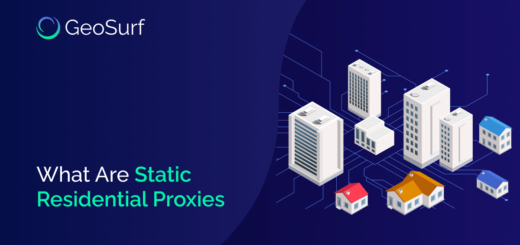What are proxies? You’ve heard people talk about them, but you aren’t sure what proxies actually are. Sounds familiar?
Well, we’re here to clear up any confusion you may have regarding proxies and help you understand them.

So, What Are Proxies?
A proxy is an intermediary that acts as a buffer between users and the internet, allowing you to hide your IP from website servers. This means, when you use a proxy, your IP doesn’t get transmitted to the site. Instead, the proxy sends out an IP address, which will come from a different location, and the site won’t be able to tell who you are and where in the world you’re located.
For instance, let’s say you live in California, but you use US proxies located in Florida. The site you visit will think you’re from Florida, not California. That’s an excellent way to hide identity on the web.
To clear up any further confusion about what are proxies, let’s take a look at different types of proxies you can choose from.
Different Types of Proxies and Their Uses
#1: Data Center Proxies
Data center proxies are dedicated proxy servers that aren’t affiliated with Internet Service Providers (ISPs). These proxies come from a secondary organization and give you full private IP authentication, top-tier anonymity, and excellent response time.
Use Cases:
Data center proxies are great for market research, and for brand protection purposes, as they work like a charm since they’re fast, affordable, and are a reliable web scraping solution.
Let’s assume someone is using your brand without authorization. Now, this can harm your brand reputation, and you may also start losing revenue fast. Harnessing data center proxies can be an excellent solution for online businesses of all shapes and sizes to identify any potential threats to their companies.
Residential Proxies
Residential proxies are IP addresses provided by ISPs to their customers. A residential proxy is a genuine/real IP attached to a physical location, meaning whenever you move to a new area and set up your internet connection, your Internet Service Provider will give you an IP address. You can simply google it to find out what your IP address is.
Use Cases:
Residential proxies are great for any data harvesting operation. For instance, travel fare aggregators use residential proxies to scrape flight prices and aggregate the collected data into their own website.
Collecting data on pricing is a tough job for travel fare aggregator websites. Travel agencies, airline sites, and other sources have robust security checks, and any robotic behavior will get banned/blocked. This is where residential proxies come to the rescue with their legitimacy.
SOCKS5 Proxies
SOCKS5 is a web protocol. You can connect to any proxy using it. It’s traffic agnostic, which means it passes whatever traffic you are sending via the server, as well as to your recipient.
SOCKS5 proxies build a TCP connection. Thus, they can transfer UDP packets throughout the connection. In essence, you can pass UDP packets onto the server, and they’re passed onto the recipient via a TCP network. Furthermore, SOCKS5 supports Domain Name Resolution and IPv6, meaning the client can specify a URL, instead of an IP address.
Use Cases:
SOCKS5 proxy servers are fast, and so they’re mostly used for online activities that don’t consist of connecting to various sites where the data can be obtained easily. SOCKS5 proxy servers are best for using peer-to-peer (P2P) services and torrenting.
SOCKS5 proxies have better security than regular proxies. They’re also great for bypassing geographic or content blocking, and hiding your location.
Static Residential Proxies
A static residential proxy is a combination of residential and data center proxies. They’re officially assigned by an ISP, and therefore offering an incredibly fast, stable, and anonymous experience to the end-user.
These proxies allow for clients to operate on the web as residential users with the same IPs for however long it’s required.
Use Cases:
Static residential proxies are best for SEO monitoring and scraping since they are IP addresses of unique devices that don’t share a subnetwork, meaning the target cannot block them. If, as a B2B client, you seek to harvest data and don’t want to get blocked, you’ll need static residential proxies so that you aren’t recognized as a bot.
Wrapping Up
If you’re a business, you’ll find the proxies mentioned above extremely helpful. We hope this article cleared up the confusion you had concerning what are proxies. If you are still a bit unsure about what proxies are, check out Oxylabs’ take on this topic. As always if you have any further queries, share your thoughts with us in the comments below.




